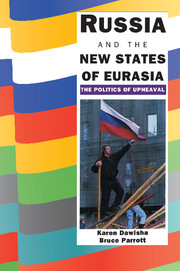Book contents
- Frontmatter
- Contents
- Preface
- Maps
- Introduction
- 1 The Legacies of History
- 2 National Identity and Ethnicity
- 3 The Impact of Religion
- 4 Political Culture and Civil Society
- 5 The Impact of Economics
- 6 Foreign Policy Priorities and Institutions
- 7 Military Issues
- 8 The Nuclear Factor
- Conclusion
- Appendix A Chronology of Events, January 1992 to October 1993
- Appendix B Compendium of Leadership and Institutional Changes in the Eurasian States, January 1992 to October 1993
- Appendix C Soviet Census Data, Union Republic and ASSR, 1989
- Notes
- Index
8 - The Nuclear Factor
Published online by Cambridge University Press: 06 July 2010
- Frontmatter
- Contents
- Preface
- Maps
- Introduction
- 1 The Legacies of History
- 2 National Identity and Ethnicity
- 3 The Impact of Religion
- 4 Political Culture and Civil Society
- 5 The Impact of Economics
- 6 Foreign Policy Priorities and Institutions
- 7 Military Issues
- 8 The Nuclear Factor
- Conclusion
- Appendix A Chronology of Events, January 1992 to October 1993
- Appendix B Compendium of Leadership and Institutional Changes in the Eurasian States, January 1992 to October 1993
- Appendix C Soviet Census Data, Union Republic and ASSR, 1989
- Notes
- Index
Summary
When the Soviet Union fell apart, citizens in the newly independent states began to focus on democracy, economic reform and statebuilding. However, for strategic planners all over the world, the central issue posed by the disintegration of the USSR was the future control of the nuclear warheads in the Soviet arsenal. If the decade of the 1970s was the era of strategic arms limitations and the 1980s the era of arms reductions, transparency and verification regimes, the 1990s has returned to a major concern of the 1960s: nonproliferation. The difference between the two decades, however, is enormous. In the 1960s, existing nuclear powers established a regime to prevent all other countries from becoming nuclear-armed powers. The success of that regime rested on the agreement among existing nuclear powers that they would not pass nuclear technology on to nonnuclear states. In the 1990s, however, the international community is trying to convince two countries – Ukraine and Kazakhstan – that already have nuclear weapons in their territories to give them up and accept a third, Russia, as the only post-Soviet nuclear state. Belarus, the fourth Soviet successor state with nuclear weapons on its territory, agreed early on that those weapons were Russian, that they should be moved to Russia according to a mutually agreed schedule, and that Belarus would remain nonnuclear. Belarus also agreed that the international community would monitor the removal of all nuclear weapons located on its territory.
- Type
- Chapter
- Information
- Russia and the New States of EurasiaThe Politics of Upheaval, pp. 258 - 279Publisher: Cambridge University PressPrint publication year: 1994



